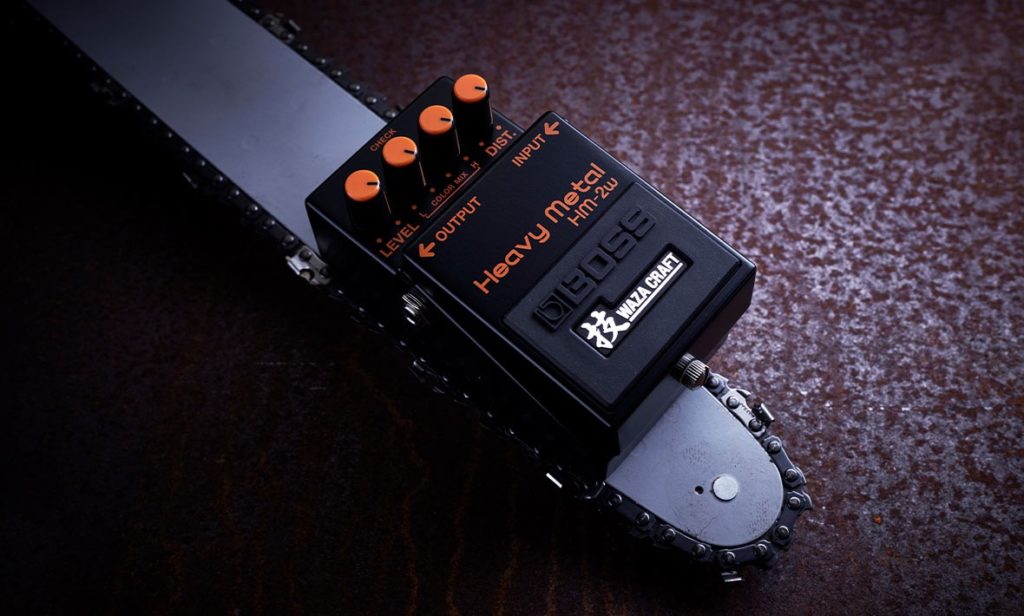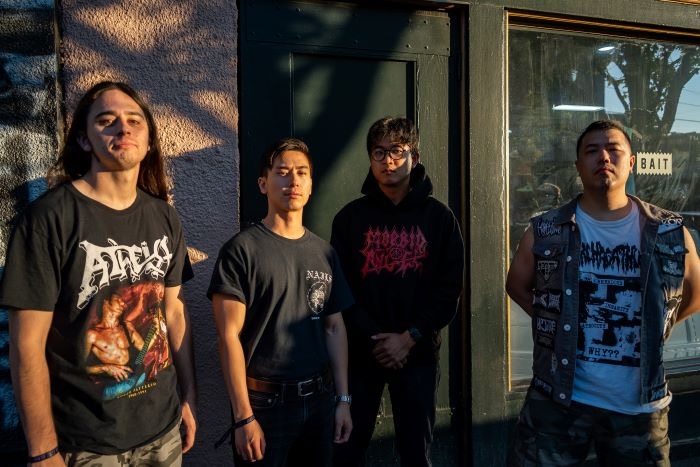When I first came across a band by the name of “Ripped To Shreds” as an opening act, I had no idea who they were. When they left the stage, I couldn’t forget them if I tried.
Musically, the band has its roots in throwback old school death metal (Stockholm’s regional “Swedish Chainsaw” strain, to be specific), occasionally making detours into the more abrasive, punk-adjacent grindcore territory for some extra mayhem. This “chainsaw” sound is achieved by the use of the now-legendary HM2 distortion pedal/amp, with all dials turned to their maximum settings, generating an iconically chromatic roar.
While the original HM-2 distortion pedal was retired from production almost 25 years ago, the Death Metal renaissance of 2010-20s inspired its manufacturer to release an upgraded reproduction as the HM-2W; it is precisely this HM-2W that is both the band’s secret sauce, and one reason why I consider RTS a truly essential live experience.
“Jubian” is the band’s first release as a full four-piece outfit, further expanding RTS’s musical palette. While melody wasn’t completely absent on the band’s previous releases, extremity- as either chainsaw-groove sections or light-speed grindcore blasts- was the band’s primary offer.
On the contrary, “Jubian” sees the band put a much stronger spotlight on melody this time around, often devoting entire sections of songs to melodic riffing; “Race Traitor” has some particularly memorable melodies.
As much as I’m all for melody in extreme metal, some reservations must be held when injecting it into a band known for wild, chaotic energy.
There are countless horror stories of once-beloved death metal bands trading extremity for melody in an attempt at greater accessibility; but, rather than hitting it big, they release something too aggressive for a mainstream audience, yet too tepid for the metalhead niche, floundering on both fronts.
Still, in spite of the countless failed attempts, melodic death metal (“melodeath”) has remained popular since its inception in the mid-1990s for good reason. If done well, Melodeath combines the best of both worlds: the muscle and groove of death metal with the memorability and artistic substance of traditional heavy metal.
With “Jubian”, RTS has hit a perfect ratio of groove, noisiness, and newfound melody; most importantly, the band didn’t have to sacrifice intensity to deliver on the album’s melodic aspirations.

https://static.roland.com/products/hm-2w/images/hm-2w_section_3.jpg ; https://www.boss.info/global/products/hm-2w/
While my purpose in album review articles is to discuss the music, it is impossible to discuss RTS without mentioning its most unique aspect: its identity as a Taiwanese-American band, fronted by an individual with feet on both sides of the pond.
According to Lee, a core purpose of RTS has always been “to increase the visibility of ABCs [American-born Chinese] in extreme metal by being very blatantly Chinese.” With RTS, Lee utilizes the medium of Death Metal to speak up for a culture that, traditionally, has sewn their own mouth shut.
Extreme Metal has a long history as a figurative “screaming pillow” for the inner turmoil of its creators, whether it be depression and anxiety, childhood trauma, societal frustration, etc., so the medium is a natural fit for Lee’s calls for ABC visibility.
Many Americans got their first glimpse into the violent police state of 1980s Brazil through the music of Sepultura, most blatantly with 1991’s “C.I.U. (Criminals in Uniform)”, demonstrating the power of the medium has in introducing American audiences to foreign perspectives in a non-intrusive way.
Beyond speaking up for the Chinese-American community, Lee uses RTS to reflect on the clashes of his two cultures, and even give glimpses into particularly shocking episodes in China’s 4000+ year history.
A perfect example of RTS’s history lessons is one my favorite tracks from “Jubian”, “Torn Apart by Five Chariots”, which chronicles the conspiracy, failed coup, and subsequent execution of Lao Ai, circa 238 BCE.
In fact, several of the songs of the album are sung entirely in Mandarin, but—given the vocal style—I wouldn’t know without seeing the lyrics sheet.
Put simply, “Jubian” is a resounding success on every level. It expands the bands sound, continues its mission of representation, and contributes to keeping the Bay Area’s 40 year hot streak burning bright.
Musically, it sees the band continuing its established HM2DM-meets-grindcore formula while expanding horizons into more melodic realms. The band uses its multicultural position to both give voice to the traditionally voiceless, and as a tasteful seasoning to further enhance the music.
“Jubian” is a bit difficult to recommend to someone who isn’t already familiar Death Metal, but it definitely has its moments of genre-transcension — most apparently, on “漢奸 (Race Traitor)”.
That said, it’s an easy must-listen for anyone who is already well-acquainted with HM2 death metal, and is open minded to deathgrind. Check it out, there’s a lot to appreciate.
Album Details
Bandcamp / Band Page (EM) / Album Page (EM)
Ripped To Shreds – 劇變 (Jubian) [14 October, 2022]
Line-up:
● Andrew Lee – Guitar/Vox
● Michael Chavez – Guitar
● Ryan Cavaleras – Bass
● Brian Do – Drums
● https://meatmeadmetal.com/2022/10/06/death-crushers-ripped-to-shreds-expose-brutal-light-on-cultural-strife-history-with-%E5%8A%87%E8%AE%8A-jubian/
○ Photo by Greg Goudey

